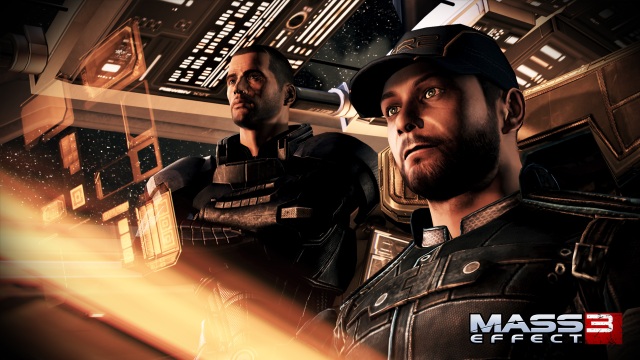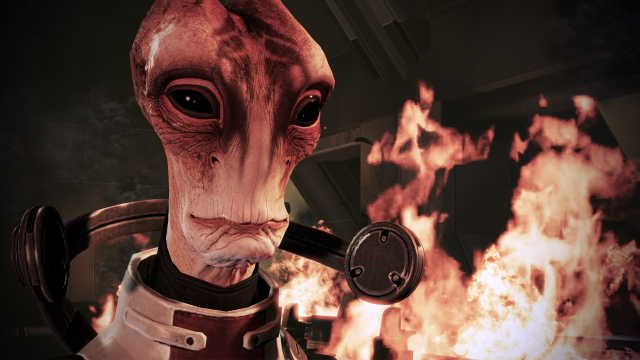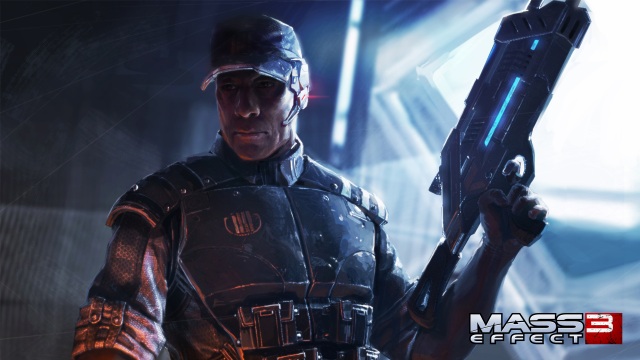The Story Mechanic Part Seventeen: The Interactive Column
BioWare really achieved something with the Mass Effect series. Let nothing that you read here, or anywhere else, distort that fact. I know they achieved something because, for all my trying, I can’t analyse any of the Mass Effect games on their own. Each individual game is part of something bigger, and together they achieve something masterful.
Wouldn’t we all be so lucky.
Despite that, the game has fallen foul of the fans (just look at the ‘Player’ metacritic score compared to the ‘Critic’ score). The reasons are varied, ranging from “I hate day one DLC” to, bizarrely, “EA want to make money” (can we just agree that publishers and developers are allowed to make a little cash – turning a profit is what gets the sequels to our favourite games commissioned).
The most interesting argument came from one of the GodisaGeek.com readers, Yukon, who felt that Mass Effect 3 was a weaker game than its forebears because “the amount of actual interaction removed from the series [by Mass Effect 3] is appalling”. I think that this an interesting issue. I think it is interesting because I respectfully disagree with Yukon.
What I hope is most interesting is why I disagree with Yukon.

I might as well start off by conceding a few points. Mass Effect 3 is the culmination of a slide from RPG to action game that began with Mass Effect 2. Doubtless, removal of character development will feel like a loss of interaction. Certainly one can point to decision for Shepherd to always be the good guy, regardless of player choices, and say that BioWare might have gone too far in terms of letting the player define the tone of the game. BioWare updating it in a patch is evidence that they probably agree with me. On the technical side, the game engine strains under the weight of BioWare’s ambition, though this has only fleeting bearing on interaction and immersion.
Let’s start at the end. Mass Effect 3’s binary ending, the simple choice of Paragon or Renegade ending has garnered much criticism. Certainly one could make a strong argument that it flies in the face of the game; that the player’s choices matter. If a player has played as a virtuous paragon throughout the game, why would Shepherd even be given the option to choose the evil ending. At the end, shouldn’t the player be the sum of their choices and be made to bear witness to what they have wrought? Does this demean the player’s earlier interactions with the game, somehow rendering their choices null and void because, whatever they have done in the past, they will end up at this point. Probably, yes, yes it does. However, if we discard the confusing plotting and poor execution (which are nothing to do with interaction) how does this really differ from Mass Effect 1 or 2. All the Mass Effect games, as it turns out, offer the player a binary choice at the end of the game, irrespective of what they player has done. In Mass Effect 2, a Paragon player could concede the Collector ship to the Illusive Man (the Renegade ending). Mass Effect has always provided the player with control over meaningful choices, and the one at the end of the game is no different from any other. It just feels different because it is at the end of the game. I am not saying it is good or bad game design, I’m just saying it is no different from the other games in the series.
It just feels different.
Here we are at the crux of my argument.

The Mass Effect series comes down to moments of meaningful, narrative choice. However, the thing about choice, is that it is impossible to immediately feel their effects. When a player decides to align with a particular race at a key plot point in Mass Effect 3, it is impossible to know how that turns out. The player is fundamentally interacting with the story, affecting the variables in BioWare’s incredible story-matrix like any other choice, but the ramifications aren’t felt in the same way. For example, think of Mordin Solus. Through the player’s actions in Mass Effect 2, Mordin can live or he can die. That is made abundantly clear in the way that Mass Effect 2 ends. In Mass Effect 3, the player wields the same power over Mordin. In many ways, much more powerfully. However, the way that the player experiences this is very different. In Mass Effect 2, it is made clear that player action causes characters to live or die. In Mass Effect 3 it is the result of a cutscene, which might make the action feel pre-determined. However, the mechanisms that get the player to the point of Solus’ death (or survival) are the same: Choices. In fact, in Mass Effect 3 it is even more complex, with decisions from across the series impacting what happens to Solus (and many of the other secondary characters).
My point is that the effects of choices players made in Mass Effect 1 and 2 have been reverberating around the universe for many hours of gameplay by the time that Mass Effect 3 is nearly finished. These choices feel like they have a larger affect on the game’s story because, as players, we have watched these choices shape the game world for hours and hours. BioWare’s skilful writers bring small choices from earlier games back around to the player so that, in Mass Effect 3, they see ramifications of choices made across two games worth of decisions. Therefore we understand the impact and the repercussions of what we decided. Small choices feel huge The choices in Mass Effect 3 simply don’t have the time to percolate through the system in the same way. That is why choices in Mass Effect 3 often have bombastic results, with secondary characters dying like fish on a dry lake bed, so the player can see the ramifications. Big choices often feel smaller, predetermined and throwaway. These just moments can’t resonate as much because there is simply no time to appreciate the context or the weight of the moment. To my mind, Mass Effect 3 isn’t less interactive, it just has less time to show the player the results of their actions.

This is further reflected in the gameplay systems. After three Mass Effect games, players shouldn’t overlook how good they have got at the games. BioWare probably missed a trick by anchoring Paragon and Renegade conversation options to fixed compass directions on the conversation wheel (north-east and south-east, respectively). This allows players to play the system, rather than read the conversation options and decide how they would want their Shepherd to respond. Again, this isn’t less interactive than previous Mass Effect games. It is the same. It just feels less interactive because it requires less investment from the player to understand it. Want a feel-good cutscene, just press up-right. Gloomy, down-right. It requires more energy to emotionally invest, because the easier option is just game the system and create a Shepherd that is one extreme or the other. BioWare tried to shake this up, but they didn’t do enough. By removing the Paragon and Renegade barometer from reputation, and following from that the unique dialogue choices that came from being “pure Paragon” or “pure Renegade”, BioWare encouraged a more, thoughtful, balanced approach. However, Paragon and Renegade is hard-wired into the Mass Effect experience at this point, so many players will strive to be one or the other. It limits interaction because it limits the thought required to play the game.
Again, the level of interaction is the same. It just feels different because the experience of playing the game has changed over time.
As I said at the beginning, BioWare really achieved something with the Mass Effect series. Don’t misunderstand though, the games aren’t perfect and different moments and creative choices are perfect fodder for debate. The ending of Mass Effect 3 will long live in memory. For me, however, the reaction to the ending has been emblematic of a game and a series that no one wanted to end, that could never do justice to what went before it. Was it perfect? No. The thing is, though, that it was consistent with the endings of the first two games (the player presented with a choice, regardless of everything that lead to that moment) and closed the series out.
I’m not lobbying that Mass Effect 3 be anyone’s favourite game but, with respect to Yukon, I feel that it is every bit the equal of its predecessors in terms of player interactivity. It is just over too quickly to really let you feel it.





